Do you have a tough time to make younger ones around you learn their lessons? Or keep their interest alive throughout? Or is it difficult to keep them occupied at home while the entire world is quarantined at home due to Coronavirus pandemic?
Well, then I think I have help for you! Efundu Comics that transforms syllabus into cartoons and comics, is probably going to ease your load. This company has a few print publications that have already reached out to several kids through schools and NGOs. Also, they’re looking at creating motion comics and their app is presently under beta testing.
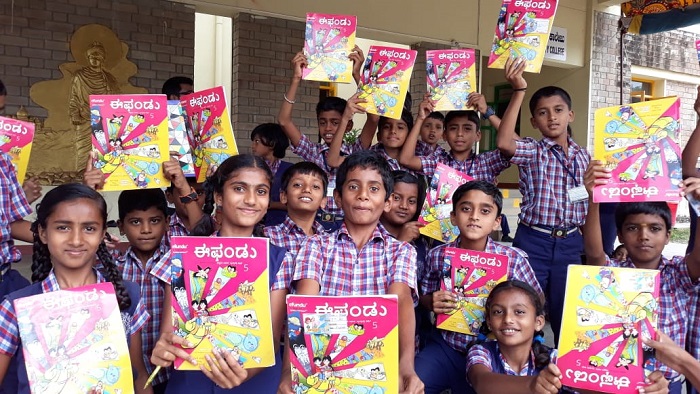
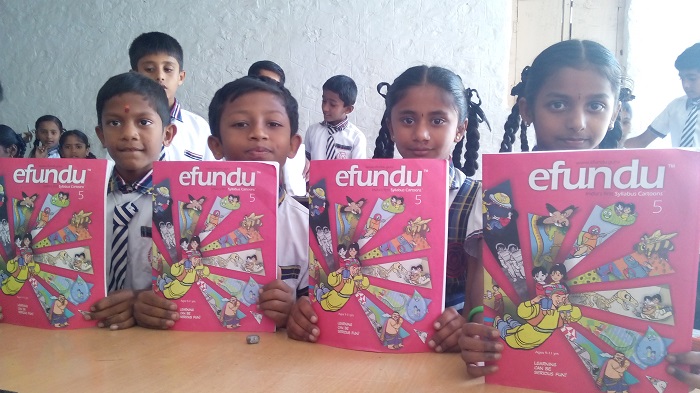
Efundu mainly creates bilingual comics to make learning and understanding easy for Government schools in Karnataka. Their content for primary school is positioned as an NCF gap for state boards and interesting revision for private students. It has cleared a DSERT Karnataka review and is now a library resource approved by Samagra Shikshana Karnataka.
Efundu has reached out to over 2000 schools and their books have helped students in more ways than one. Presently, Efundu focuses on Value Education for classes one and two, and EVS for classes three, four and five.
Besides that, Efundu also creates comic strips for science topics which appeared in Times NIE last year. NGOs like Akshaya Patra, Akshara, Agastya, India Literacy Project, Art of Living, ACTS, Parikrma, Makkala Jagriti, Hippocampus have partnered with them. Their teacher partner is Meghshala Foundation, and Swami Vivekananda Youth Movement (SVYM) school, Viveka School of Excellence uses their content in their schools.

AnimationXpress had a chat with Efundu founder and former Lintas creative director Vijay Srinivas Prativadi about this unique initiative. Here’s what he said :
1. How many books have you published as of now? Are these e-books/comics available on the app?
While doing the pilot we did one book as three versions – only English, bilingual English-Kannada and bilingual English-Hindi. After the first pilot of 10,000 copies were given out, we printed another 7000 of these.
We started as a social impact project around equal education for primary school with an objective to be Syllabus driven, stress free, self learning pedagogy.
While we waited for three years for government endorsement, we have done other books for NGOs in Careers for India Literacy Project and Constructivism for Agastya Foundation.
On our Efundu EVS books, the new print run should happen soon with the new versions as two more books are in production. We were told to break every book content into 12 storybooks instead of 1 storybook with 12 lessons to make commercial sense. But we are keeping it to the syllabus format as of now. This is the thin balance between educating and entertaining that we are trying to maintain.
Flip books are not yet available fully on app. But the e-versions of 6 stories are already there, along with assessment that the child can take after reading the story.
2. When do you plan to launch the app?
The beta version is already out. We have put six stories with assessment, apart from value education topics like body safety rules done with Enfold foundation, school safety rules done with UNESCO and helmet safety rules done with Exide Life Insurance. We plan to add a career planner directory soon which will highlight careers that are open to the class 12 student to plan. We try to work with domain experts on our content.
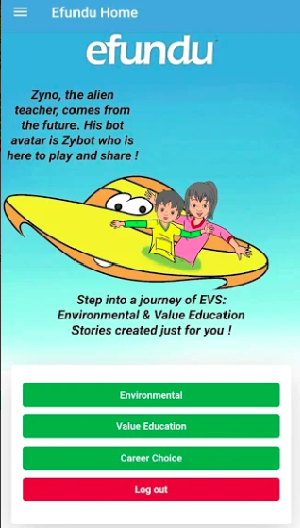 3. Why did you decide to come up with Efundu? When was it found?
3. Why did you decide to come up with Efundu? When was it found?
Efundu, or fun in edu (education), was first started as a social impact initiative to reach good quality content to an underprivileged child, either through an NGO or a govt school. We evolved it a little more when we approached the Government, as Efundu offered to fill the NCF gap for state board schools. After an initial pilot with 1000 schools with 6 stories in 2015, we have evolved it into a bilingual for government and topic based learning for private students with an intent to balance the content as books and apps.
We have also co-created a career planner book with India Literacy Project and on Constructivism for teachers with Agastya International Foundation. All our content and characters are our IP with a registered trademark.
After a four year test and state and national pilot to test cartoons in schools, we have now gone commercial in 2019 as HapiLipi Tech and we are developing content and tech.
4. Who creates the content for the comics out of school textbooks? Is it difficult to cram everything important within comical cartoons?
We have a team of writers, artists and tech people who create the comics in-house now. We also have consultants who partner us, from science concepts to illustrations to balance the workload. Once the storyboards are weighted by teachers, we create the final comic strips and design in-house. From a content point of view, we are able to cover up to 80 per cent of the points from the prescribed lesson, 20 per cent will be updated new content or developments that are useful to the students. For instance, the water lesson has been extended to cover a few points on rain water harvesting and recyclability of water through a visual idea. It helps the student and the teacher to start an engaging conversation. We believe that content points should lead to discussions around them so comics can act as a beautiful trigger.
5. How did you guys collaborate with NGOs, schools and Government schools?
The approach of comics to teach itself is beautiful so we have been welcomed where we show it. The only hitch is that everyone wants to know if it can really help in learning and score marks. Though we believe that igniting minds is the real score, providing assessments or testing helps all stakeholders feel more confident. That’s why we use both approaches of printed books and the app. NGOs take it for their classroom libraries that they run in the schools they are present, in Karnataka or in other parts of India. Private schools usually would like to have it in their libraries as they use varied content.
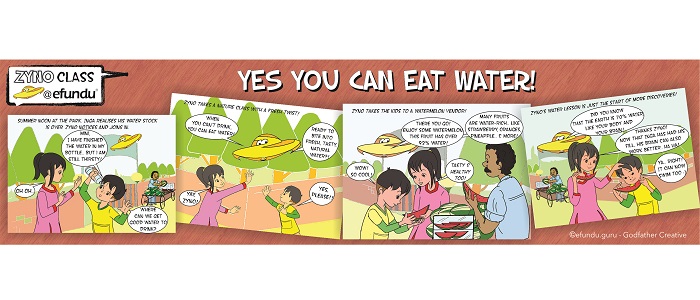
The Karnataka Government carried out a DSERT review of our books and finally endorsed us as a library resource to fill the NCF gap in the state board. It will help us to roll Efundu out in thousands of schools across the state. Next step is to go national, once more books are ready.
We also have a new partner – Viveka School of Excellence that has introduced our book in its syllabus and all students are given the book by the school. This is part of the Swami Vivekananda Youth Movement (SWYM) at Sarguru, off Mysore.
6. Once you launch the app, what will be its model? Will put some comics behind the paywall?
Currently, we are populating the app though it’s android version is already available free for everyone. We have also put it on our website developed on python and we plan to add more Machine Learning to it to further the spirit of enquiry for the students. We hope to also add a paid model once all the content is set up. Some content will be free and some paid for. Especially the assessments will be made chargeable soon. It may also help schools to partner for quick anytime assessments, topic based.
7. How many pages generally do the comics have?
The English ones are around 28 pages while the bilingual ones at 52 pages. We can easily make it into more pages, but we try to limit the number of pages based on a concept board approach with around 20 boxes per lesson. The content is dense as every box can have a concept to talk about. We have minimised the fluidity of storytelling to keep the focus on content and not just its form. Though there have been requests to make every lesson into a book, we are looking into its viability, as we want the comics nature of entertainment to take learning forward. Once the format is loveable like comics, learning is bound to follow naturally.
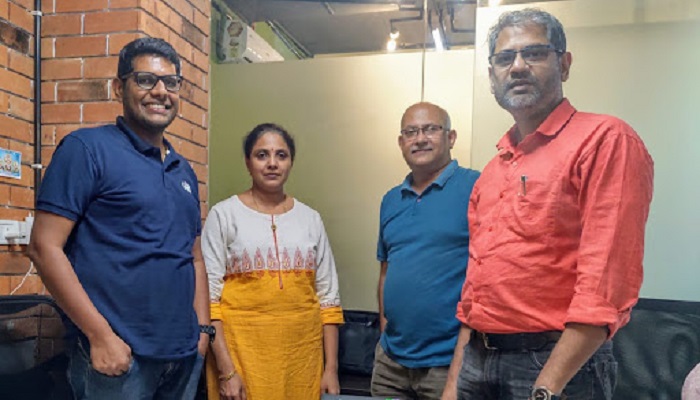
Efundu Comics is doing heir bit in best way possible for them. Now it’s time for us to come forward and support this wonderful initiative and hard work of these magicians.
